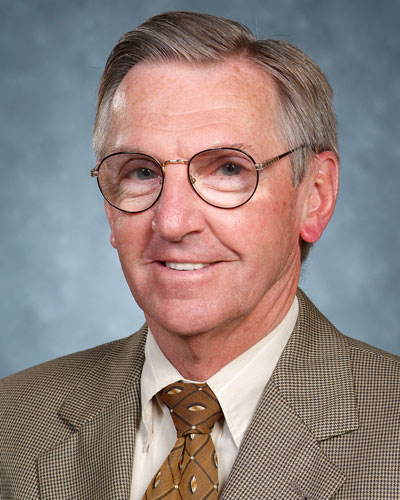Becher Co-Authors Paper on Physician Burnout
April 5, 2017
Dr. John Becher, DO '70, has co-authored a new paper dealing with physician burnout.
The paper focuses on various areas including depression and suicide among doctors.
One of the basic tenets of osteopathic medicine is to consider the patient as a whole,
comprising mind, body and spirit. A new paper published in NAM Perspectives and authored by several leaders in the field of osteopathic medicine—including John Becher, DO ’70, chair, emergency medicine—say that perspective should also be applied to physician
wellness.
“We want students and young physicians to look in the mirror and see themselves as
they see their patients,” said Dr. Becher, who is a former president of the American Osteopathic Association (AOA).
As physicians face increasing pressures such as education debt, increased patient
and administrative workloads, more and more complex medical knowledge, and patient
self-diagnoses—along with many of the other stressors faced outside of their job—the
rates of physician burnout, depression and suicide ideation have increased. In fact,
roughly 400 physicians commit suicide each year.
“In doing research for this paper, it was particularly shocking to me to see the degree
of burnout that occurs among students before they even have the experience of seeing
patients,” said Dr. Becher, adding that within his particular specialty of emergency
medicine, rates of physician burnout were highest. “It’s physically and emotionally
stressful,” he explains. “It can impact your personal life, your hobbies and the time
you spend with your family.”
The authors of the paper suggest that key stakeholders—including medical schools,
training programs, employers, families, and society at large—play a role in facilitating
physician wellness by considering all of those factors in a holistic fashion, the
same way osteopathic medicine physicians are trained to understand their patients.
Dr. Becher says that he and fellow authors found that the physicians who were least
likely to experience burnout generally had more well-rounded lives. “They had other
factors to essentially take their mind off of medicine,” he said. “The more you don’t
do outside of medicine, the worse it can be.”
The authors propose the AOA use the information presented in the paper to develop
programs that address the issue of depression and burnout among physicians.
“This is a public health problem, in that it affects the ability of doctors to provide
the best care to their patients,” said Dr. Becher.
You May Also Like:
About Philadelphia College of Osteopathic Medicine
Established in 1899, Philadelphia College of Osteopathic Medicine (PCOM) has trained
thousands of highly competent, caring physicians, health practitioners and behavioral
scientists who practice a “whole person” approach to care—treating people, not just
symptoms. PCOM, a private, not-for-profit accredited institution of higher education,
operates three campuses (PCOM, PCOM Georgia and PCOM South Georgia) and offers doctoral degrees in clinical psychology, educational psychology, osteopathic
medicine, pharmacy, physical therapy, and school psychology. The college also offers
graduate degrees in applied behavior analysis, applied positive psychology, biomedical
sciences, forensic medicine, medical laboratory science, mental health counseling,
physician assistant studies, and school psychology. PCOM students learn the importance
of health promotion, research, education and service to the community. Through its
community-based Healthcare Centers, PCOM provides care to medically underserved populations.
For more information, visit pcom.edu or call 215-871-6100.
Contact Us
For general media inquiries, please contact the Office of Marketing and Communications
at 215-871-6300 or communications@pcom.edu. Visit our media relations page to view contact information for public relations personnel.
Connect with PCOM


